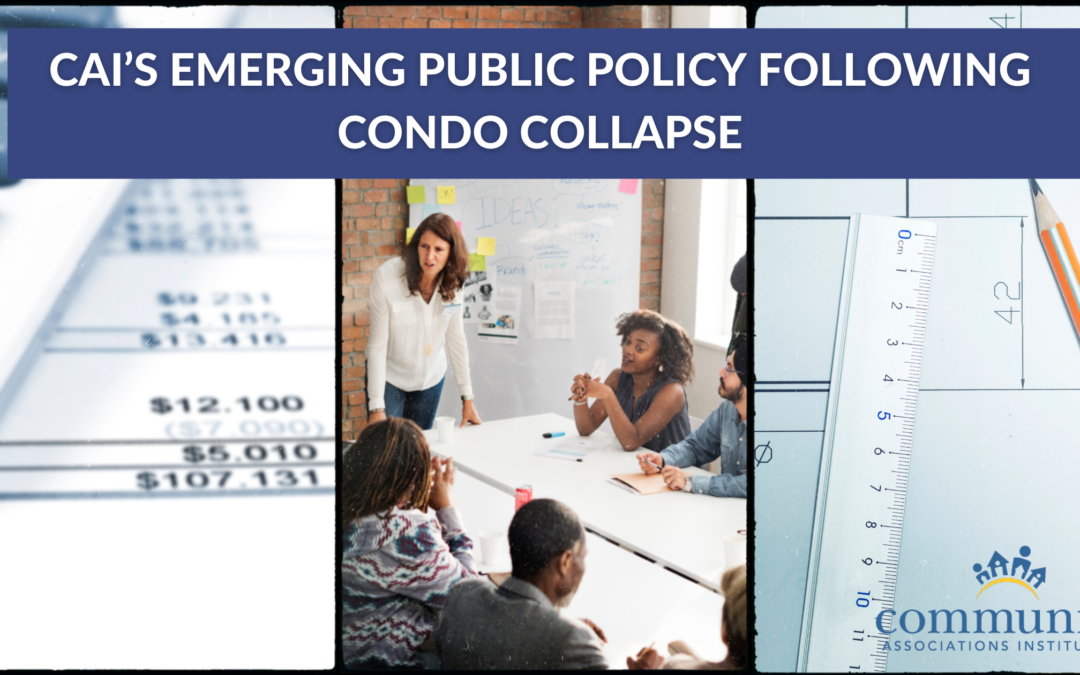Immediately following the devastating collapse of the Champlain Tower South Condominium in Surfside, Fla., CAI’s Government and Public Affairs Committee convened a special meeting with expert attorneys, builders, reserve specialists, and insurance professionals. Three task forces were appointed with the purpose of identifying recommendations for public policies, changes and updates to best practices, and guidance for local, state, and federal legislators as they discuss solutions to prevent this type of disaster in their districts.
The three working groups were given a 30-day goal of producing their first piece of work. The task forces were focused on:
Building inspections and maintenance. Led by Robert M. Diamond, a fellow in CAI’s College of Community Association Lawyers (CCAL); Mitch Frumkin, RS, a professional engineer (PE) licensed by the National Society of Professional Engineers; and Stephen Marcus, a CCAL fellow.
Reserve study and funding plans. Led by Robert W. Browning, PCAM, RS; Mitch Frumkin, PE, RS; and Lisa Magill, a CCAL fellow.
Insurance and risk management. Led by Jennifer Eilert, CIRMS; Phil Masi, CIRMS; AJ Scott, CIRMS; and Cliff Treese, CIRMS.
Each task force engaged between 50 and 300 participants from across the country and from different disciplines. Reserve study providers made up the majority of the participants in the reserve study task force. The insurance task force consisted mostly of insurance professionals.
The task forces met weekly for the past four weeks. In addition, the team leaders connected weekly to ensure their work was not overlapping and to share progress. Since there were so many people involved in the activities, surveys were used to capture support of positions. There was a tremendous amount of conversation and different perspectives, which we believe contributed to the quality of these recommendations.
The CAI Board of Trustees, Government & Public Affairs Committee, and members of legislative action committees were presented with the task forces’ public policy recommendations during the CAI Annual Conference and Exposition: Community NOW in Las Vegas this week.
Within the next 30 days, Government & Public Affairs Committee members, legislative action committee members, members of CAI’s three membership representation groups, and CCAL fellows will be invited to participate in a survey to indicate support or opposition of each policy recommendation.
The Government & Public Affairs Committee will reconvene to vote on recommendations.
Within the next 60 days, the CAI Board of Trustees will be presented with the Government & Public Affairs Committee recommendations for consideration and vote.
The Government & Public Affairs Committee was asked to consider the following high-level topics.
BUILDING INSPECTIONS
- Developers will provide a preventive maintenance schedule including all components that are the responsibility of the community association, not just the components included in the reserve study.
- All multifamily residential buildings of concrete, load-bearing masonry, steel, or hybrid structural systems such as heavy timber and those with podium decks will include a baseline inspection and regular inspections based on specific intervals. The protocol for these building inspections can be found in the American Society of Civil Engineers’ Guideline for Structural Condition Assessment of Existing Buildings (SEI/ASCE 11-99) or other industry standards. The initial baseline inspection is identified as the preliminary assessment within this guide. If necessary, a detailed assessment as defined within this guide may be required.
Committee proposals also included specifics regarding communication and disclosure to homeowners, residents, and local governments, as well as proposals authorizing community association boards to administer special assessments if funding is needed in an emergency situation.
RESERVE STUDY AND RESERVE FUNDING PLAN
Whether or not state law should mandate or oppose:
- Regular reserve studies for all community associations.
- Reserve funding.
- Disclosure, including summary of reserve study, current funding, and funding plan during annual budgeting.
- Allowing owners to waive/opt out of state law reserve study and funding requirements.
- Funding for emergent life-safety repairs by authorizing the association governing board to special assess or borrow funds without a vote of the membership.
CAI thanks the three task forces for their work on these important projects. Check back here for more updates and review the latest information, resources, and guidance on condo safety.




The current ways of building inspection method and process can be complemented by the Digital technologies using different types of sensors, continuous data acquired through them 24×7, advanced data analytics, weather data.
Sensors can measure building sway i.e. amplitude, frequency, time to retreat (after the sway from vertical position how much time it takes to come back to the original potion), ground settlement and / or building settlement, rate of settlement. The time elements is important. In Seismic zone, we should get the seismic vibration patterns as well. They can measure the atmospheric variables as well such as temp, humidity, acidity, alkalinity, wind speed, direction etc.
These characteristics can be measured every year for 3 months of so to understand the progressive behaviour of the building.
Inference can be drawn intelligently such as a) if the sway / displacement under the same loading condition has become more in the subsequent year and how much more. Inordinately extra meaning the building has reduced strength for some reason that needs further investigation.
No building collapses suddenly. We have to pick up such indications from Digital data through Advance Data Analytics using Data Science techniques much ahead of the time.
The data analytics will show the patterns which will need to be investigated, actioned upon appropriately.